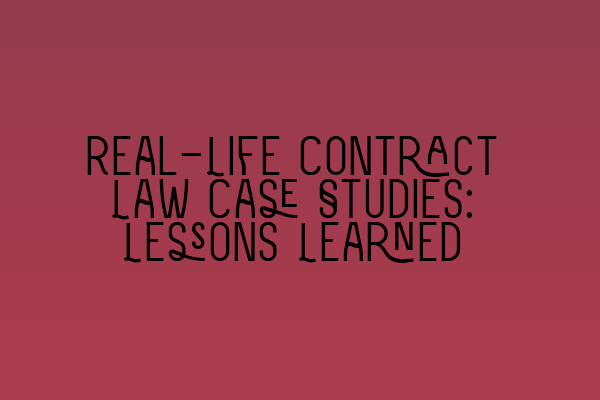Real-Life Contract Law Case Studies: Lessons Learned
Contract law is fundamental to all aspects of business and commercial transactions. It provides the legal framework within which parties can establish their rights and obligations. While contract law may seem straightforward in theory, it can often be complex and nuanced in practice.
In this blog post, we will explore real-life contract law case studies to gain insights into the intricacies and challenges faced in contractual agreements. We will examine the lessons learned from these cases, providing valuable guidance to professionals in the legal industry.
Case Study 1: Breach of Contract in Commercial Leases
In a high-profile case involving a commercial lease agreement, the landlord accused the tenant of breaching the contract by subleasing the property without prior consent. The tenant argued that the sublease was necessary due to financial hardships. The court ruled in favor of the landlord, emphasizing the importance of obtaining written consent for any subleasing arrangement.
This case highlights the significance of clearly defining and enforcing the terms of a lease agreement. Landlords and tenants must be proactive in ensuring that all parties involved are aware of their rights and obligations. Additionally, it underlines the importance of seeking legal advice before entering into any contractual agreement.
Case Study 2: Non-Compete Clauses in Employment Contracts
A software developer signed an employment contract that included a non-compete clause. After leaving the company, the developer began working for a competitor, prompting the former employer to seek legal action against them. The court enforced the non-compete clause, barring the developer from working for the competitor for a specified period.
This case showcases the significance of carefully drafting and negotiating non-compete clauses in employment contracts. Employers must ensure that these clauses are reasonable in scope and duration, taking into account the industry norms and the employee’s role within the organization. Employees, on the other hand, should seek legal advice to understand the implications of such clauses before signing any contract.
Case Study 3: Force Majeure and Contractual Performance
During the COVID-19 pandemic, many businesses faced challenges in meeting their contractual obligations due to lockdowns and travel restrictions. A marketing agency, unable to fulfill its contractual duties, invoked the force majeure clause to seek relief from liability. The court upheld the agency’s argument, considering the extraordinary circumstances caused by the pandemic.
This case highlights the importance of including a force majeure clause in contracts, especially in situations where unforeseen events could hinder performance. Businesses should carefully review and clearly define what constitutes a force majeure event and the remedies available to both parties.
Case Study 4: Implied Terms in Consumer Contracts
In a case involving a defective product, a consumer sought a refund from the retailer citing a breach of contract. The court ruled in favor of the consumer, stating that the retailer had breached its obligations under the implied terms of the Sale of Goods Act. These terms include the requirement for the goods to be of satisfactory quality, fit for purpose, and as described.
This case emphasizes the crucial role of implied terms in consumer contracts. Businesses must understand and comply with these implied terms to avoid costly legal disputes. Consumers, on the other hand, should be aware of their rights under the law and seek legal advice if they believe their rights have been violated.
Conclusion
These real-life contract law case studies offer valuable insights into the complexities and challenges faced in contractual agreements. They highlight the importance of clearly defining and enforcing contract terms, seeking legal advice before entering into agreements, and understanding the implications of various clauses and statutory requirements. By learning from these case studies, legal professionals can navigate contract law more effectively and ensure the best possible outcomes for their clients.
For further resources and preparation for the SQE exams, visit these related articles:
